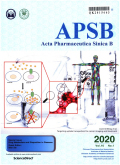- 钛学术文献服务平台 \
- 学术期刊 \
- 医药卫生期刊 \
- 药学期刊 \
- 药学学报(英文版)期刊 \
null
Efficacy of inverso isomer of CendR peptide on tumor tissue penetration
基本信息来源于合作网站,原文需代理用户跳转至来源网站获取
摘要:
The dense extracellular matrix and high interstitial fluid pressure of tumor tissues prevent the ability of anti-tumor agents to penetrate deep into the tumor parenchyma for treatment effects.C-end nile (CendR) peptides can enhance the permeability of tumor blood vessels and tumor tissues via binding to neuropilin-1 (NRP-1),thus aiding in drug delivery.In this study,we selected one of the CendR peptides (sequence RGERPPR) as the parent L-peptide and substituted D-amino acids for the L-amino acids to synthesize its inverso peptide D(RGERPPR).We investigated the NRP-1 binding activity and tumorpeaetrating ability of D(RGERPPR).We found that the binding affinity of D(RGERPPR) with NRP-1 and the cellular uptake was significantly higher than that of RGERPPR.Evans Blue tests revealed that D(RGERPPR) exhibited improved tumor-penetrating ability in C6,U87 and A549 tumor-bearing nude mice.Using nude mice bearing A549 xenograft tumors as a model,we found that the rate of tumor growth in the group co-administered with D(RGERPPR) and gemcitabine (Gem) was significantly lower than the gemcitabine-treated group with a tumor suppression rate (TSR%) of 55.4%.Together,our results demonstrate that D(RGERPPR) is a potential tumor-penetrating peptide.

推荐文章
期刊_丙丁烷TDLAS测量系统的吸收峰自动检测
带间级联激光器
调谐半导体激光吸收光谱
雾剂检漏 中红外吸收峰 洛伦兹光谱线型
不同盐度、温度及光照对漂浮浒苔生理生态的影响
浒苔
盐度
温度
光照
生理生态
期刊_联合空间信息的改进低秩稀疏矩阵分解的高光谱异常目标检测
高光谱图像
异常目标检测 低秩稀疏矩阵分解 稀疏矩阵 残差矩阵
内容分析
关键词云
关键词热度
相关文献总数
(/次)
(/年)
引文网络
引文网络
二级参考文献 (128)
共引文献 (4)
参考文献 (26)
节点文献
引证文献 (0)
同被引文献 (0)
二级引证文献 (0)
1979(1)
- 参考文献(1)
- 二级参考文献(0)
1987(1)
- 参考文献(1)
- 二级参考文献(0)
1995(1)
- 参考文献(0)
- 二级参考文献(1)
1997(2)
- 参考文献(1)
- 二级参考文献(1)
1998(3)
- 参考文献(2)
- 二级参考文献(1)
2000(1)
- 参考文献(0)
- 二级参考文献(1)
2001(2)
- 参考文献(0)
- 二级参考文献(2)
2002(1)
- 参考文献(1)
- 二级参考文献(0)
2003(1)
- 参考文献(0)
- 二级参考文献(1)
2004(2)
- 参考文献(2)
- 二级参考文献(0)
2005(2)
- 参考文献(0)
- 二级参考文献(2)
2006(2)
- 参考文献(2)
- 二级参考文献(0)
2007(1)
- 参考文献(1)
- 二级参考文献(0)
2008(3)
- 参考文献(0)
- 二级参考文献(3)
2009(2)
- 参考文献(1)
- 二级参考文献(1)
2010(4)
- 参考文献(3)
- 二级参考文献(1)
2011(4)
- 参考文献(0)
- 二级参考文献(4)
2012(5)
- 参考文献(1)
- 二级参考文献(4)
2013(7)
- 参考文献(0)
- 二级参考文献(7)
2014(12)
- 参考文献(3)
- 二级参考文献(9)
2015(18)
- 参考文献(2)
- 二级参考文献(16)
2016(26)
- 参考文献(1)
- 二级参考文献(25)
2017(12)
- 参考文献(0)
- 二级参考文献(12)
2018(26)
- 参考文献(1)
- 二级参考文献(25)
2019(10)
- 参考文献(0)
- 二级参考文献(10)
2020(5)
- 参考文献(3)
- 二级参考文献(2)
2018(26)
- 参考文献(1)
- 二级参考文献(25)
- 引证文献(0)
- 二级引证文献(0)
研究主题发展历程
节点文献
Inverso isomer
CendR peptide
Neuropilin-1 (NRP-1)
Tumor penetration
Gemcitabine
研究起点
研究来源
研究分支
研究去脉
引文网络交叉学科
相关学者/机构
期刊影响力
药学学报(英文版)
主办单位:
出版周期:
双月刊
ISSN:
2211-3835
CN:
10-1171/R
开本:
出版地:
北京市先农坛街1号
邮发代号:
创刊时间:
语种:
eng
出版文献量(篇)
688
总下载数(次)
0
期刊文献
相关文献
推荐文献

 免费查重
免费查重










